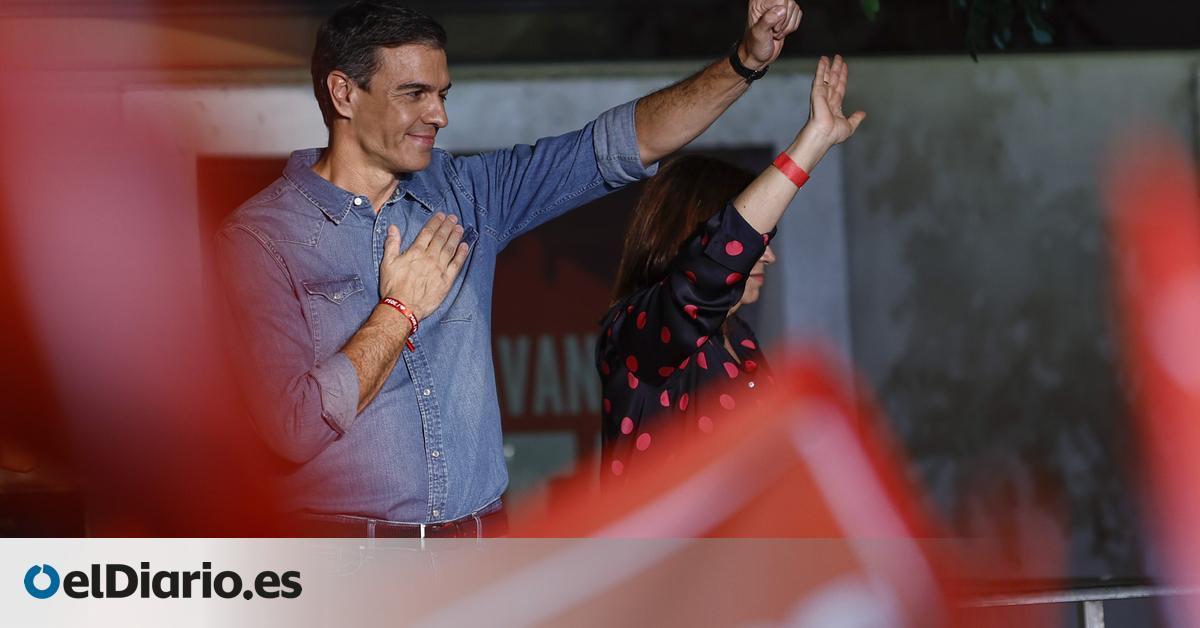
A heart attack scrutiny, as has not been remembered in Spain in the last 30 years, leaves the left on the verge of re-editing the coalition and Pedro Sánchez with options to continue four more years in La Moncloa. He needs the votes of the left and of the nationalist and pro-independence parties, with an a priori obstacle that is difficult to overcome: convincing Carles Puigdemont’s party to facilitate a government with his abstention. During the last weeks, Junts has said that he will vote against all the options in the investiture. The first words of their candidate, Miriam Nogueras, last night, suggest that they are not going to make it easy: “We will not make Pedro Sánchez president for nothing.”
The talks in the coming weeks will determine whether Junts agrees to an abstention or the country is heading towards a blockade and new elections in the coming months. That is the main unknown of a day, which, according to the environmental noise, was going to bury Sánchez and what has been dubbed the “Frankenstein Government.”
In the second headline of the night, the PP wins the elections, if by that one means being the list with the most votes, but it falls far short of all its objectives. Its leader, Alberto Núñez Feijóo, insisted throughout the campaign that his model was that of Juan Manuel Moreno Bonilla in Andalusia and Isabel Díaz Ayuso in Madrid. In other words: the absolute majority. It lacks 40 deputies. Nor will he be able to implement his plan B, the pact with Vox that would imply putting leaders of the extreme right in the Government, as the popular leader admitted that he would do two weeks ago. Together they add 169 seats. With the UPN deputy and the Canarian Coalition, the right could reach a maximum of 171. The block on the left reaches 172. The triumphal walk towards La Moncloa that the popular and some polls anticipated two months ago, when the municipal and regional map was dyed blue, is not going to be.
Despite the fact that the accounts do not come out, Feijóo appeared on the balcony of Génova 13 flanked by the president of Madrid, Isabel Díaz Ayuso, the mayor, José Luis Martínez-Almeida and other members of his party, to announce his intention to try to form a government.
“I am in charge of starting the dialogue to form a government in accordance with the majority will of the Spanish people, so that no one is tempted to blockade Spain again. It is a legitimate request, and the anomaly that in Spain the party with the most votes could not govern only as it has an alternative to the blockade that in no way benefits Spain, international prestige and the security of our investments. I ask, therefore, the party that has lost the elections, because it has been surpassed by the PP, expressly, not to block the Government of Spain once again. It is what has always happened. All the most voted candidates have governed: Suárez, Felipe González, Rodríguez Zapatero, Mariano Rajoy and even Pedro Sánchez”.
What Feijóo proposes is not even a decision that is up to him, the King has to decide after a round of consultations and evaluate who has more support. It is also the opposite of what the PP did four years ago with Sánchez, and it also clashes with the policy of recent pacts of his party, after the municipal and regional ones, where the popular ones evicted the PSOE in the Canary Islands, Extremadura and some capitals such as Toledo and Valladolid.
The plea, for the PSOE to let him govern with 136 of 360 deputies and a large majority of the Chamber against it, was made by Feijóo after his most bitter electoral day. The candidate who counted his campaigns by absolute majorities wins and recovers three million votes, if compared to Casado in 2019, but he remains light years behind the Government and even sees how the distance with the PSOE has been reduced for two months. Then the PP took control of all the territorial power and the distance was 3.4 points, this 23J, when it asked for the final push to “evict sanchismo”, the difference is reduced to 1.3 points and 300,000 ballots.
Because the PSOE of Pedro Sánchez, who called the elections the day after the electoral disaster, not only does not collapse but adds 800,000 votes to the result of 2019 and two more seats. Hence, their leader appeared exultant, at the edge of midnight, mounted on a small improvised scaffolding at the gates of Ferraz. Amid cries of “they will not pass” from the militants, Sánchez congratulated himself on the decision to call the polls on May 29: “I called the elections because I believed, as I have always believed, that we had to decide which course to take, one of progress, or one of retreat, as the involutionist bloc of Partido Popular and Vox proposes. Spain has been very clear. The citizens have been emphatically clear, the involutionist bloc that proposed the total repeal of all the advances of recent years has failed. There are more of us who want Spain to move forward and it will continue to be that way”.
The only good news for Feijóo, after a year and a half at the helm of the party, is that the reunification of the right-wing continues: not only does he receive the ten Ciudadanos deputies in 2019, the last time he ran, he also remains 19 from Vox, which crashes at the polls (goes from 52 four years ago to 33) although it manages to remain as the third force. Beyond opposing a hypothetical investiture session for Sánchez, his role seems irrelevant in the legislature that is starting.
With a face like a funeral, around midnight, its leader ironically congratulated Feijóo “for winning the elections and not depending on Vox.” The far-right leader asked Feijóo if he would maintain the pact offer to the PSOE, and accused him of “selling the bear’s skin before hunting it” and even “laundering the Socialists.”
Sumar, the coalition of 15 parties to the left of the PSOE, which was making its debut in these elections, scored 31 seats, seven fewer than those obtained by Unidas Podemos, Más Madrid and Compromís in 2019. The left to the left of the PSOE saves the furniture because its main objective was to avoid the coalition of Feijóo and Abascal. With her voice broken by so many campaign events, Yolanda Díaz congratulated herself last night: “People who were worried are going to sleep more peacefully. Democracy has won today, it comes out stronger, we have won, today we have a better country. We told them that they were starting the campaign with a story that said they were going to win the elections and the script has changed, we have made it possible to improve people’s lives”.
23J leaves another fine print for the PP: in Madrid, Feijóo gets 160,000 fewer votes than Isabel Díaz Ayuso two months ago. In Andalusia, the result that gave the absolute majority to Moreno Bonilla tied. These are data that many insiders are going to look at with a magnifying glass from now on. On the good news side, the PP has an absolute majority in the Senate, to act as a counterweight to a hypothetical left-wing government if Sánchez achieves another investiture.
Seen in the rear-view mirror, the numbers left by these generals point to a change of cycle. 15 years after the financial crisis, the emergence of the 15M and the emergence of multipartyism, the PP and PSOE have 258 seats, both above 115, something that had not happened since 2008, in the second victory of José Luis Rodríguez Zapatero, before the fall of Lehman Brothers.
The bipartisanship recovers, in little more than one legislature the 4.1 million votes that Ciudadanos added in April 2019 have evaporated, when they aspired to surprise the PP. And the left to the left of the PSOE reinvented in Sumar part with 3.3 million votes, still a long way from the five million and 76 seats of Podemos in 2016.
The vote points to some clues for future electoral events: in Euskadi, for example, EH Bildu is fighting for the leadership of nationalism tied with the PNV, with less than a year to go before the Basque elections.
In Catalonia, the independence bloc has collapsed. The PSC is the first force, Sumar reaches the second position, ahead of ERC and Junts. The PP is fourth force with six seats and the CUP disappears.
And despite this collapse and the worst electoral result in its recent history, the 23J that was supposed to bury Sanchismo leaves the future of the country in the hands of Junts: left-wing coalition or electoral repetition.
————————————————
Our voice is needed more than ever
Without an independent press, they will not be able to resist democratic rights and freedoms and that is why elDiario.es has become a very uncomfortable medium, which some would like to keep quiet about. We are one of the few reference newspapers that remains free, that does not whitewash the ultras or is captured by the right. You, who read us regularly, know it well. Can you imagine what journalism would be like in Spain if elDiario.es did not exist? What would public debate be like without our voice? Can you imagine what Spain we would have?
If you’re worried about what might happen in this country, support us. Today we need you more than ever. Become a member, become a member, of elDiario.es.
Source: www.eldiario.es

